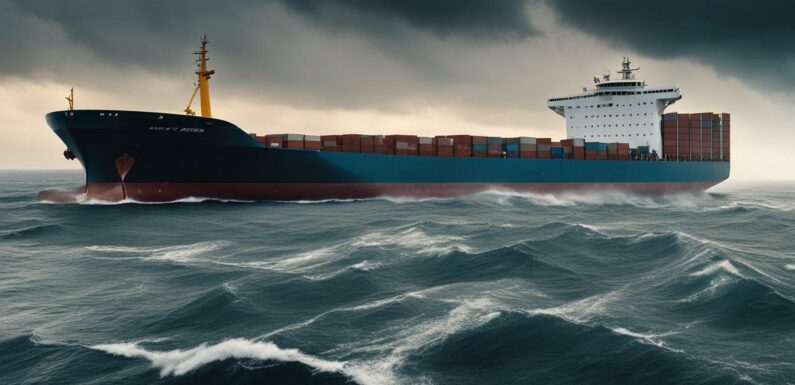
Cargo ships play a critical role in global trade, transporting goods across the seas to reach their intended destinations. While maritime trade has always been essential to the global economy, it also faces various threats that can compromise the safety and efficiency of cargo ships. As such, it is crucial to enhance cargo ship security to ensure safer maritime trade and safeguard the global supply chain.
Effective cargo ship security measures can mitigate risks such as piracy, smuggling, and terrorism, among others. With the latest advancements in technology, training and education programs, and international cooperation, these measures have become more accessible and efficient. The implementation of these measures can enable cargo ships to navigate today’s ever-changing seascape safely and maintain the smooth flow of goods across regions.
- Enhancing cargo ship security is essential to ensure safe and efficient maritime trade.
- The implementation of advanced technology, training, and international cooperation can mitigate risks to cargo ship security.
- Piracy, smuggling, and terrorism are among the threats that can compromise cargo ship security.
- Properly trained crew members, security personnel, and port officials play a vital role in securing cargo ships.
- The future trends and challenges in cargo ship security will require continuous adaptation and investment in effective security measures.
Understanding the Threats to Cargo Ship Security
Ensuring the security of cargo ships is crucial for reducing risks associated with maritime trade. Various factors can pose threats to cargo ship security, including piracy, smuggling, and terrorism.
Piracy is one of the most common threats faced by cargo ships. Pirates target cargo ships in order to steal valuable goods or hold crews for ransom. They often use violence and force to achieve their goals, posing a significant risk to the safety and security of cargo ships.
Smuggling is another threat that can compromise cargo ship security. Smugglers use cargo ships to transport illegal goods, such as drugs, weapons or contraband, which can lead to legal repercussions for the ship’s crew and operators. Smuggling can also increase the risk of security incidents, such as confrontations with law enforcement or other security forces.
Terrorism is a growing concern in the maritime industry. Terrorist groups may target cargo ships to disrupt logistics and supply chains, harm economies or even cause widespread damage and casualties. The use of explosives, small arms, or other weapons can cause significant harm to cargo ships, endangering the lives of crew members and causing damage to the ship’s infrastructure.
These threats can have a serious impact on maritime trade, affecting the timely and efficient delivery of goods and services.
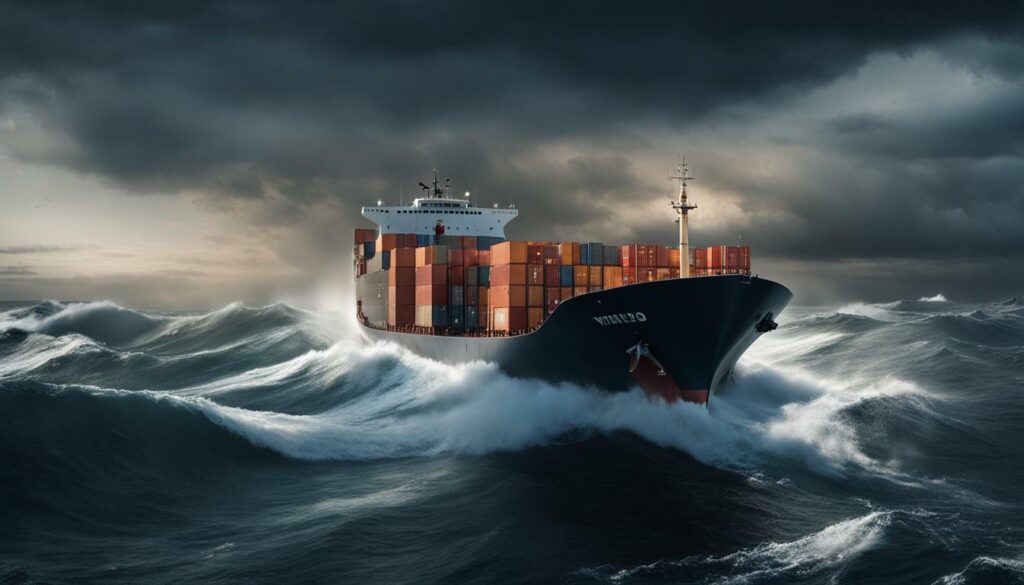
“Ensuring the security of cargo ships is crucial for reducing risks associated with maritime trade.”
Implementing Technological Solutions for Cargo Ship Security
In recent years, there has been a significant rise in concerns over cargo ship security due to factors such as piracy, smuggling, and terrorism. To mitigate the risks and ensure the safety of cargo ships, the implementation of advanced technological solutions has become increasingly important.
One key area where technological solutions can be applied to improve cargo ship security is surveillance systems. Advanced camera and sensor technologies can be used to monitor ships for any suspicious activity while also detecting potential threats, such as unauthorised access or breaches in cargo handling. In addition, access control measures can be implemented using biometric technology to ensure that only authorised personnel can access certain areas of the ship.
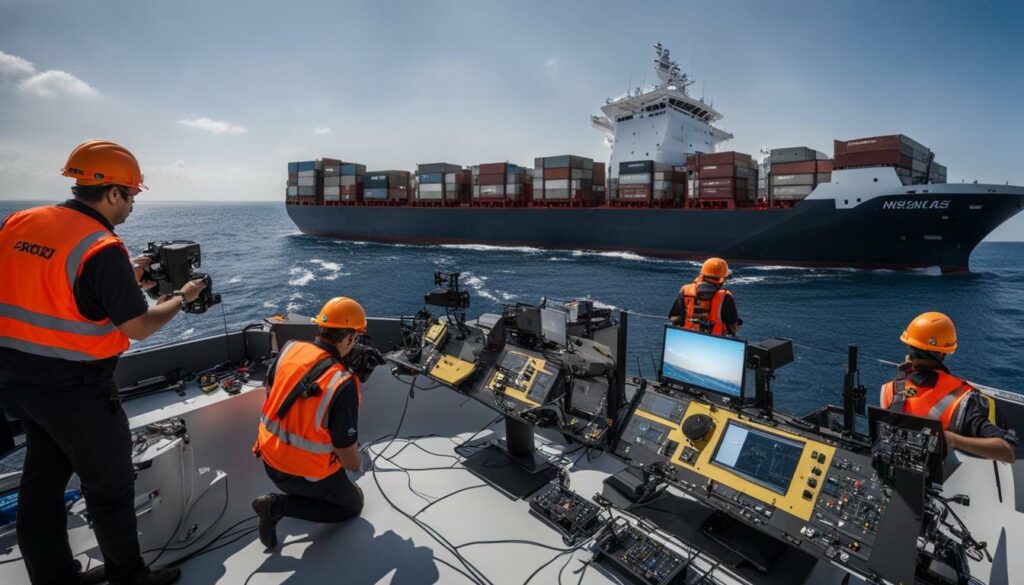
Another critical aspect of cargo ship security is the ability to communicate effectively in real-time, just like in security for super yachts. This can be achieved through the use of advanced communication technologies, such as satellite-based systems, which allow ships to stay connected with the shore and relevant authorities during transit. In case of any emergencies or security incidents, this real-time communication can prove essential in coordinating effective responses and minimising risks.
While technological solutions offer significant benefits in enhancing cargo ship security, their implementation can also pose challenges. Technological solutions require significant investment in terms of costs, resources, and infrastructure. In addition, there may be concerns over the compatibility of different technologies used by different stakeholders in the maritime trade ecosystem.
As such, it is essential to adopt a holistic approach to implementing technological solutions for cargo ship security. This includes collaboration among different stakeholders, including shipping companies, port authorities, and government agencies. Joint efforts can help to identify the most suitable technologies for different use cases, promote standardisation, and reduce duplication of efforts.
Overall, implementing advanced technological solutions is crucial in enhancing cargo ship security and ensuring the safe and efficient flow of goods through the maritime trade network. Despite the challenges, the benefits of advanced technologies such as surveillance systems, access control measures, and communication technologies outweigh the costs. Continued investment in technology, combined with effective cooperation and coordination among stakeholders, will be key in ensuring the continued safety and security of cargo ships.
Strengthening International Cooperation in Maritime Security
In today’s globalised world, maritime trade is a crucial economic activity that relies on secure and efficient cargo shipping. However, the nature of maritime trade poses unique security challenges that require international cooperation and collaboration among nations and organisations.
Maritime trade involves the movement of goods and commodities across oceans, requiring cargo ships to navigate through various territorial waters and international shipping lanes. This complex network of maritime trade routes creates vulnerabilities that can be exploited by criminals and terrorists.
Effective international cooperation is essential for enhancing cargo ship security and ensuring the safe and efficient flow of goods across borders. Through cooperation, countries can share information, resources, and expertise to identify and respond to potential security threats.
The International Maritime Organization (IMO) is a specialised agency of the United Nations that plays a crucial role in facilitating international cooperation on maritime security. The IMO promotes the development of global standards and regulations for safe and secure shipping and collaborates with member states to implement these measures.
Regional partnerships and initiatives can also play a significant role in strengthening international cooperation on maritime security. For example, the European Union has developed a comprehensive approach to maritime security that involves cooperation among member states, as well as with non-EU countries and organisations.
In addition to formal partnerships, informal networks and alliances can also be effective in enhancing cargo ship security. For example, the Voluntary Intermodal Sealift Agreement (VISA) is a non-binding agreement among commercial shippers and the U.S. Department of Defense to provide sealift capacity in the event of a national emergency.
Overall, international cooperation is vital for addressing the complex and evolving threats to cargo ship security in the context of maritime trade. By fostering collaboration and implementing effective security measures across borders, countries and organisations can ensure the safe and efficient flow of goods across the seas.
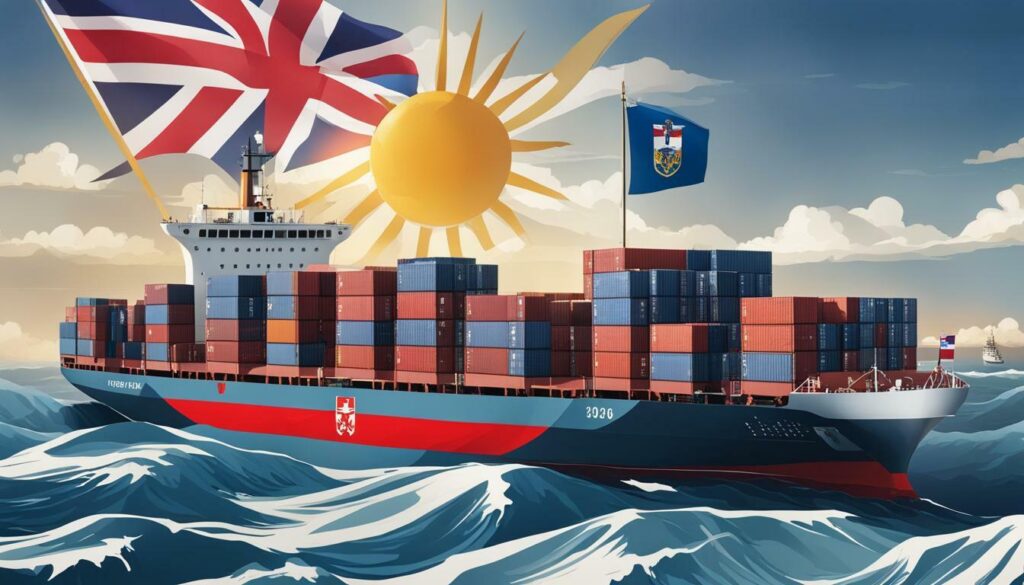
Proper training and education are essential components in improving cargo ship security. Crew members, security personnel, and port officials need to be adequately trained to identify potential security threats and respond effectively to security incidents. By implementing comprehensive training programs, shipping companies can ensure that their staff is well-prepared for any security scenario.
Effective training programs should cover a range of topics, including the identification of potential security threats, emergency response procedures, and the use of advanced security technology. Crew members should also receive regular training on the safe handling of cargo, as well as the correct use of equipment and machinery, to prevent accidents and ensure safe and efficient shipping operations.
In addition to training, ongoing education is also an important aspect of enhancing cargo ship security. Shipping companies should stay up-to-date with the latest security technologies, regulations, and industry best practices to ensure that they are well-equipped to address current and emerging security threats.
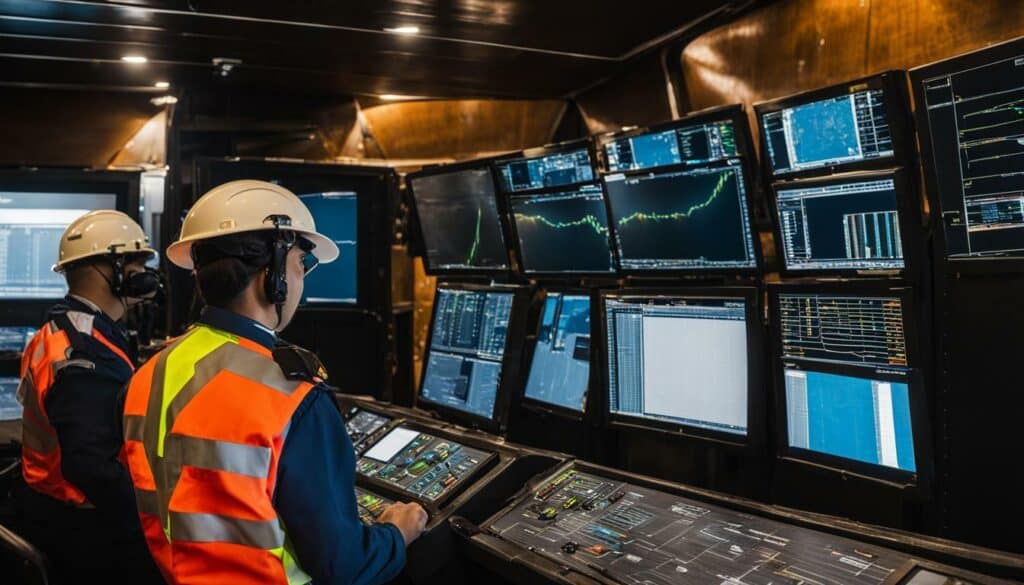
Training and education should also be extended to the wider maritime industry, including port authorities, shipping associations, and government agencies. By fostering a culture of security awareness and best practices, we can work together to ensure safer and more efficient maritime trade.
Investing in training and education is a long-term commitment that requires continuous effort and resources. However, the benefits of a well-trained and educated workforce are invaluable in enhancing cargo ship security and safeguarding the integrity of maritime trade.
Future Trends and Challenges in Cargo Ship Security
The world of maritime trade is constantly evolving, and with it comes new trends and challenges that must be addressed to ensure the continued safety and efficiency of cargo ships. Here, we will examine some of the most significant future trends and challenges in cargo ship security.
One of the most prominent trends is the increasing use of autonomous ships. While these ships have the potential to improve efficiency and reduce costs, they also raise concerns about cybersecurity and the ability to respond to emergencies without human intervention. As more autonomous ships enter the seas, it will be crucial to develop effective security measures and protocols to mitigate these risks.
Another trend is the rising threat of cyber attacks. With the growing reliance on technology in the shipping industry, cyber attacks can have serious consequences. From disrupting operations to compromising sensitive data, these attacks can pose a significant threat to cargo ship security. As such, it will be important to invest in robust cybersecurity measures to prevent and respond to attacks.
Challenges also arise from the changing regulatory landscape. New regulations, such as the International Maritime Organization’s (IMO) recent sulphur cap, can impact the safety and efficiency of cargo ships. Compliance with these regulations can be costly and complex, and failure to comply can result in penalties. As such, it will be important to stay up-to-date with the latest regulatory changes and develop strategies to comply with them effectively.
Finally, climate change presents a significant challenge to cargo ship security. Rising sea levels, extreme weather events, and other climate-related impacts can affect shipping routes and port infrastructure, potentially compromising the safety and efficiency of cargo ships. It will be important to develop resilient infrastructure and adapt to changing conditions to ensure the continuity of safe and efficient maritime trade.
While future trends and challenges in cargo ship security present new risks, they also offer opportunities for innovation and improvement. By investing in advanced technology, cybersecurity measures, and adaptive strategies, we can meet these challenges and ensure the continued safety and efficiency of maritime trade.
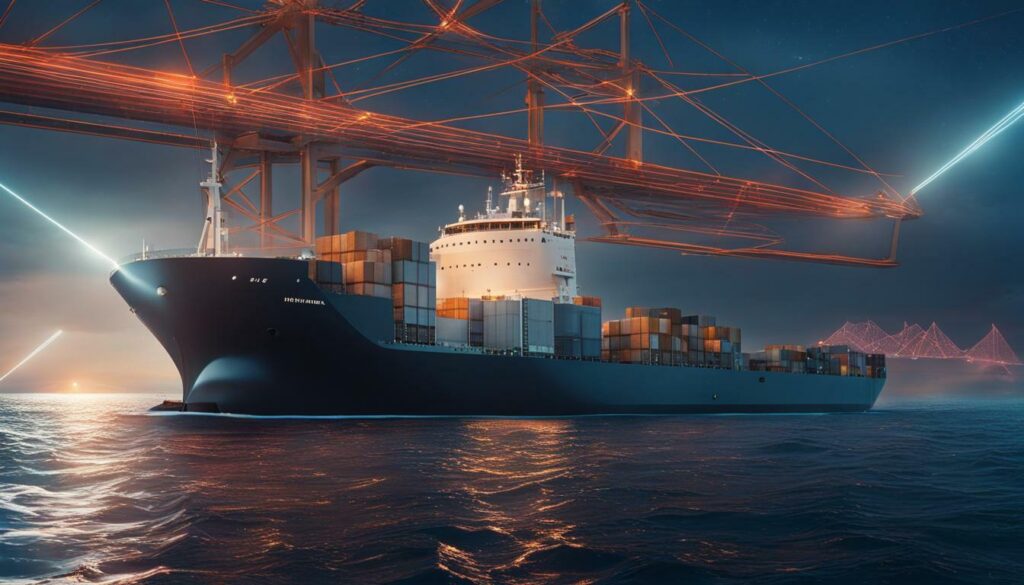
It is imperative to enhance cargo ship security for safer maritime trade. The risks to cargo ship security in the context of maritime trade are diverse and ever-evolving, making it necessary to adopt advanced strategies and measures to mitigate them.
Technological solutions such as surveillance systems, access control measures, and communication technologies can be implemented to safeguard cargo ships. However, it is equally crucial to strengthen international cooperation to foster collaboration and implement effective security measures across borders.
Investing in training and education for crew members, security personnel, and port officials is also pivotal in improving cargo ship security. Properly trained personnel can identify potential threats and respond effectively to security incidents.
Future Trends and Challenges in Cargo Ship Security
Looking ahead, there are various emerging trends and challenges that may impact cargo ship security and maritime trade. The evolving technological landscape, changing regulatory environment, and new forms of security threats are some of the challenges that need to be addressed.
Continued efforts and adaptation to future trends and challenges will be crucial in safeguarding the integrity of cargo ship security in the years to come. By prioritising and investing in safety and security, we can ensure the smooth flow of goods across the seas while reducing the risks to cargo ships and those aboard them.
FAQ
Q: Why is cargo ship security important for safer maritime trade?
A: Cargo ship security is crucial for safer maritime trade as it helps protect valuable cargo, ensures the safety of crew members, and maintains the integrity of global supply chains. By implementing effective security measures, we can mitigate risks and safeguard the smooth flow of goods across the seas.
Q: What are the threats to cargo ship security?
A: There are various threats that pose risks to cargo ship security, including piracy, smuggling, and terrorism. These threats can disrupt the safety and efficiency of cargo shipping, potentially leading to financial losses and endangering lives. Understanding and addressing these threats is essential for maintaining secure maritime trade.
Q: How can technological solutions enhance cargo ship security?
A: Technological advancements play a crucial role in enhancing cargo ship security. Surveillance systems, access control measures, and communication technologies can be implemented to monitor and protect cargo ships. These solutions help in identifying potential risks and responding promptly to security incidents, ensuring the safety and efficiency of maritime trade.
Q: How does international cooperation strengthen cargo ship security?
A: International cooperation is vital in strengthening cargo ship security. Organisations such as the International Maritime Organization (IMO) and regional partnerships foster collaboration between nations, facilitating the implementation of effective security measures across borders. By sharing information and resources, countries can collectively address security challenges and ensure the smooth flow of goods.
Q: Why are training and education important for cargo ship security?
A: Training and education are critical for enhancing cargo ship security. Properly trained crew members, security personnel, and port officials are better equipped to identify potential threats and respond effectively to security incidents. Through regular training programs and continuous education, individuals involved in maritime trade can contribute to maintaining a secure and resilient environment.
Q: What are the future trends and challenges in cargo ship security?
A: The future of cargo ship security will involve adapting to emerging technologies, navigating a changing regulatory landscape, and addressing evolving threats. Advancements in areas such as artificial intelligence, drones, and autonomous systems will present both opportunities and challenges in ensuring the safety and efficiency of maritime trade. Adapting to these trends will be crucial for maintaining effective cargo ship security.


